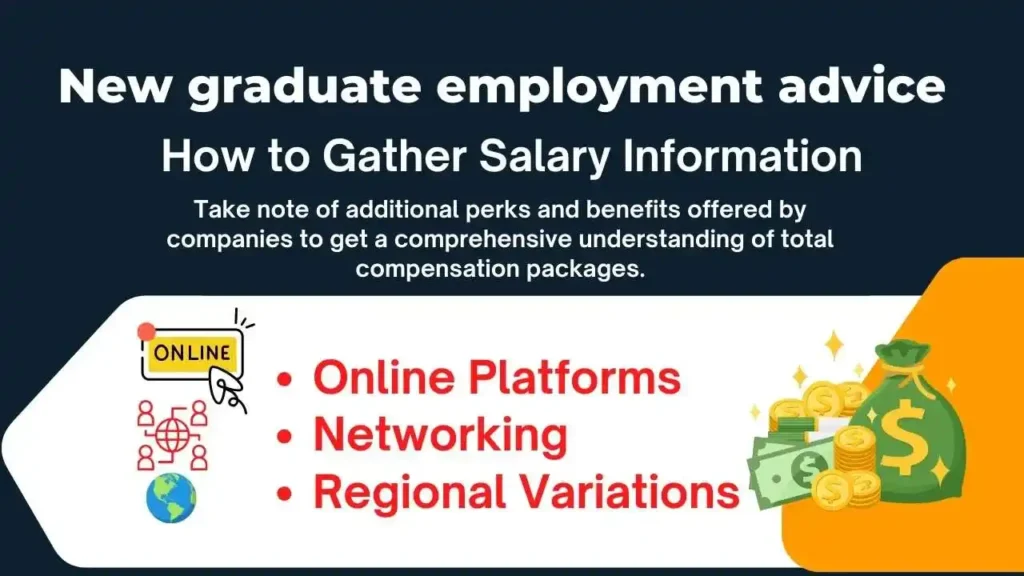Landing your first job as a fresh graduate is an exhilarating experience. However, when it comes to salary discussions, many new professionals feel hesitant or unprepared. Mastering effective salary negotiation tips is essential to ensure you start your career with a compensation package that reflects your skills and potential.
In this guide, we will walk you through actionable strategies for negotiating your first salary. From understanding your market value to handling compensation discussions confidently, these salary negotiation tips will empower you to secure a better starting salary.
Table of Contents
You can read also our post on “How to Secure an Internship in the Gulf: 8 Key Steps to Follow“.

How to ask for a better starting salary
Why Salary Negotiation Tips Matters for Fresh Graduates
Entering the job market as a fresh graduate is challenging. Companies often offer entry-level salaries with the assumption that candidates lack negotiation skills. However, discussing compensation as a graduate sets the tone for your professional journey and establishes your value in the industry.

Benefits of Effective Salary Negotiation Tips
- Increased Lifetime Earnings: Negotiating a higher starting salary can significantly impact your long-term earning potential.
- Greater Job Satisfaction: Knowing that your employer values your skills and contributions boosts your morale.
- Enhanced Career Confidence: Successfully negotiating your first salary builds confidence for future compensation discussions.
Read Also: Top 10 Common Interview Mistakes and How to Avoid Them Easily
1. Research Industry Salary Standards
Knowledge is power when entering salary negotiations and getting the answer to the question “What Are Your Salary Expectations?” during the hiring process. One of the most crucial salary negotiation tips is to research current market trends and industry standards.

How to Gather Salary Information
- Online Platforms: Use sites like Glassdoor, PayScale, and LinkedIn Salary Insights to get an idea of what companies are offering for similar roles.
- Networking: Speak with professionals in your industry to gain insights into salary expectations.
- Regional Variations: Keep in mind that salaries may vary based on location, even within the same industry.
Pro Tip: Take note of additional perks and benefits offered by companies to get a comprehensive understanding of total compensation packages.
2. Understand Your Value and Build Your Case
As a fresh graduate, you may not have extensive work experience, but that doesn’t mean you lack value. Highlight your skills, education, internships, and achievements.

How to Build a Strong Case
- Highlight Academic Achievements: If you graduated with honors or completed relevant coursework, mention it.
- Internship Experience: Showcase any hands-on experience that is directly related to the job.
- Soft Skills: Communication, problem-solving, and teamwork are highly valued by employers.
Example: “During my internship at XYZ Company, I successfully led a project that increased process efficiency by 15%. I believe this experience positions me well to contribute effectively to your team.”
Read Also: How to Ace Your Job Interview: Essential Tips for Fresh Graduates to Land Your Dream Job
3. Practice and Perfect Your Pitch
Confidence is key when discussing compensation as a graduate. Rehearse your salary negotiation conversation to ensure you communicate effectively.

Steps to Craft a Winning Pitch
- Start with Gratitude: Thank the employer for the job offer and express your excitement.
- State Your Value: Emphasize your relevant skills and experiences.
- Make a Clear Request: Politely but confidently ask for a specific salary or compensation package.
Sample Script: “Thank you for this opportunity. I’m very excited about joining your team. Based on my research and the value I can bring to this role, I would like to discuss a starting salary of $55,000.”
Pro Tip: Practice in front of a mirror or with a friend to build confidence.
4. Be Flexible and Open to Perks
If the employer cannot meet your salary request, explore alternative benefits. Entry-level job salary tips often emphasize the importance of non-monetary perks.

Valuable Perks to Consider
- Professional Development: Training programs and certifications
- Flexible Work Arrangements: Remote work options or flexible hours
- Health and Wellness Benefits: Comprehensive insurance packages
Negotiation Example: “If the budget doesn’t allow for a higher salary, I would appreciate additional training opportunities or a review after six months.”
Read Also: How to Prepare for Your First Job Interview as a Fresh Graduate
5. Know When to Walk Away (Gracefully)
Sometimes, an offer may not meet your expectations, even after negotiations. Knowing how to handle this situation professionally is essential.

When to Decline an Offer
- The salary is significantly below market standards.
- The company is unwilling to negotiate or offer alternative benefits.
- The role doesn’t align with your career goals.
How to Politely Decline: “Thank you for the opportunity and your time during the interview process. After careful consideration, I have decided to pursue other opportunities that better align with my career goals and compensation expectations.”
Pro Tip: Maintain a positive relationship with the employer, as you may cross paths in the future.
FAQs About Salary Negotiation Tips for Fresh Graduates
When is the right time to discuss salary during the job interview process?
The ideal time to discuss salary is after the employer has expressed strong interest in hiring you, typically during the final interview or once a job offer has been extended. Bringing it up too early can shift the focus from your qualifications to compensation, which may reduce your leverage.
How can I determine a reasonable salary for my first job?
To determine a fair salary for your first job, research:
Industry averages using sites like Glassdoor, PayScale, or Indeed
Regional salary trends based on cost of living
Entry-level positions in your specific field Also, consider reaching out to professionals in your network or alumni groups to gain real-world insights.
What should I do if I have no prior work experience?
If you lack formal work experience, emphasize:
Academic achievements
Internships or volunteer work
Transferable skills like communication, teamwork, critical thinking, or technical proficiency Presenting your potential and eagerness to learn can impress employers more than experience alone.
Is it okay to negotiate a starting salary as a fresh graduate?
Absolutely. Employers expect candidates to negotiate, even if you’re a recent graduate. Be respectful but assertive—do your research, understand your worth, and present a rationale for your request. This demonstrates confidence and professionalism.
How should I respond if the employer says the salary is non-negotiable?
If salary is non-negotiable, ask about:
Alternative benefits (e.g., bonuses, paid leave, or health insurance)
Professional development opportunities
A performance review schedule for potential raises after 3–6 months
This approach keeps the conversation open and shows flexibility.
What are some common mistakes to avoid during salary negotiations?
Avoid these pitfalls:
Entering negotiations without doing market research
Undervaluing your worth out of fear of rejection
Being overly aggressive or demanding
Failing to consider the full compensation package (not just base salary) A respectful and well-informed approach yields better results.
How do I handle multiple job offers with different salary packages?
When juggling multiple offers:
Compare total compensation, not just salary (e.g., bonuses, healthcare, training)
Factor in work-life balance, career growth, company culture, and commute
Politely inform employers you need time to evaluate options
Make a decision that aligns with your long-term goals, not just short-term gains.
What non-monetary perks are worth negotiating for?
Non-monetary perks can significantly impact your job satisfaction. Consider negotiating for:
Flexible work hours or remote work
Professional development courses
Extra vacation days
Wellness programs
Mentorship or leadership opportunities
These perks often have long-term value beyond salary.
How can I build confidence for salary negotiations?
To feel more confident:
Practice your pitch with friends or mentors
Prepare talking points and salary data
Use role-playing scenarios to reduce anxiety
Remind yourself that negotiation is a normal and expected part of the hiring process
Confidence comes from preparation and self-awareness.
Can I negotiate salary after accepting a job offer?
It’s not ideal to negotiate salary after accepting a job offer, as it may appear unprofessional. However, if new responsibilities arise or you discover market data that significantly shifts your value, approach the discussion tactfully. Alternatively, plan to revisit compensation during your first performance review.
What should I do if I feel underpaid after starting my job?
If you believe you’re underpaid:
Document your accomplishments and added responsibilities
Research current salary benchmarks
Schedule a meeting with your manager and present your case with evidence Be respectful and patient—focus on performance-based growth.
Read Also: How to Build a Winning Resume for Fresh Graduates: 8 Step-by-Step Guide
Key Takeaway
Effective salary negotiation as a fresh graduate requires preparation, confidence, and a clear understanding of your value. By researching market standards, building a strong case, practicing your pitch, and remaining open to perks, you can secure a compensation package that meets your expectations and sets the foundation for a successful career.
Ready to ace your first salary negotiation? Share your thoughts or experiences in the comments, and don’t forget to check out our other career advice blogs at GetHire.net!















